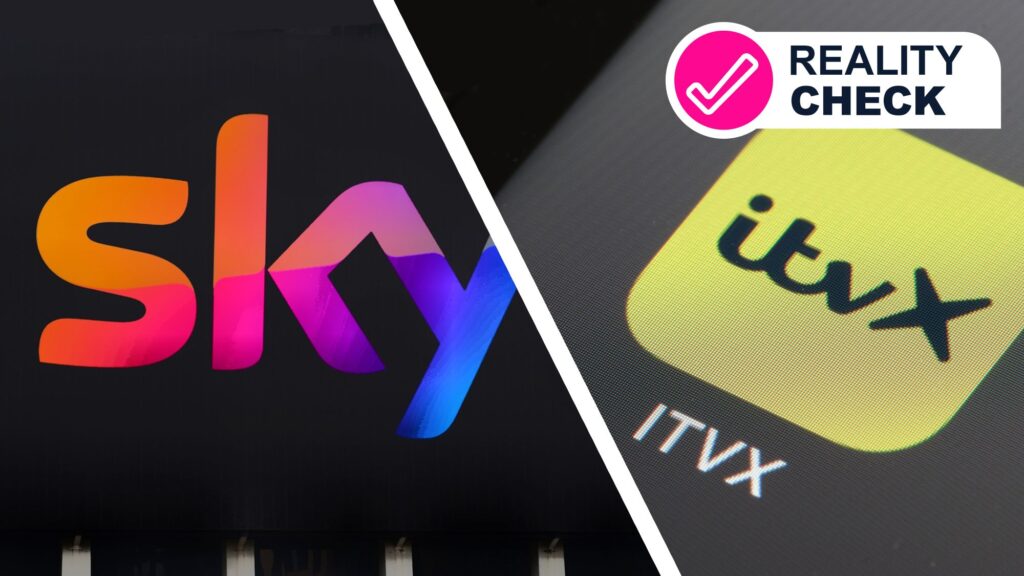- ITV says it is in “preliminary” discussions to sell its broadcasting arm to Sky
- The move would be a massive shake-up for British television if it goes through
- Analysts say viewers could expect Sky and ITV’s offerings to merge
The UK TV landscape could be about to change in a big way, with ITV revealing it is in “tentative” talks to sell its broadcasting arm to Sky for £1.6bn.
The deal is far from being completed or approved by UK regulators. But if it goes through, it will see Sky (owned by US-based cable giant Comcast) gobble up ITV’s Media and Entertainment division. That includes all its free-to-air channels and the ITV X streaming service.
So what does it all mean for the average Downton Abbey fan or Sky subscriber? Will ITV’s channels remain free-to-air? And what does this mean for current and future shows on both platforms?
Here are some of the big questions answered by media and TV experts…
Will ITV continue to be free?
Yes, at least for the foreseeable future. ITV has public service obligations from its license that run until 2034. A Sky deal would not change that.
Tom Harrington, a TV analyst from Enders Analysis, says ITV’s free-to-air is also likely to be one of the main reasons for the potential deal. “ITV remains profitable and the reach it has as the major commercial broadcaster is probably the main reason it would be attractive to Comcast/Sky”.
However, Sky’s focus could increasingly shift from ITV’s broadcast offering to its online streaming platforms – and could eventually see ITVX and NOW TV merge.
“Online video advertising remains a key area for growth as audiences increasingly turn to the convenience of the expansive catalogs available to them via streaming. As such, monetizing this space is essential to broadcasters’ ongoing strategies,” said Peter Ingram, head of research at Ampere Analysis.
“A sale of ITV to Sky is likely to lead to an acceleration of the development (and possible integration) of streaming propositions such as ITVX and NOW with a focus on expanding online video subscription and advertising revenue,” he added.
In other words, expect ITVX and its ITVX Premium subscription to be the primary focus if this deal goes through. Not that traditional broadcast television would stand in the way.
“ITV’s linear operations could be rationalised, but key assets will remain to continue to monetise the still significant audience loyal to linear TV”, added Peter Ingram.
What could this mean for current TV series?
Major changes for ITV or Sky viewers are unlikely in the short term due to existing agreements and contracts. But one thing you can expect to see is more ITV shows on Sky and vice versa.
“An immediate effect of a combination could be an element of integration of Sky and ITV’s programming assets,” predicts Peter Ingram of Ampere Analysis.
“The two companies are among the highest content consumers in the UK, with ITV providing a range of locally resonant shows, news and sports rights. Sky provides local and international first-run and library film and TV series, major sports rights (such as Premier League football) and news. The two operators could use some of these programming assets across a combined entertainment power ecosystem,” he added.

However, Tom Harrington of Enders Research believes the changes could be more of a slow burn. “From a viewing perspective, in the short term there probably wouldn’t be many noticeable changes: the ITV and Sky offerings would remain the same,” he said.
“Over time, Comcast/Sky may have different opinions to the current ITV management on how to monetize free-to-air and there may be channel changes and a different approach to ITVX,” he added.
The nature of the deal – which does not include ITV’s production arm, ITV Studios – could also ultimately affect the kind of shows you watch on its channels. ITV Studios produces shows such as Love Island and I’m a celebrity… Get me out of here and The voice. They could one day find another home, some analysts predict.
“The biggest customer at ITV Studios is ITV itself, and more than half of all ITV’s viewing is from shows it makes in the Studios itself,” explains Harrington. “So if Comcast/Sky were to acquire ITV broadcasts, then we would assume that would include a long-term agreement that guaranteed the flow of content from ITV Studios to the channels/ITVX,” he noted.
“However, even with some kind of agreement, one could foresee over time that the relationship between these two parts would weaken from the current level,” he said.
Is this good or bad news for TV viewers?
It is too early for final conclusions on the deal as the talks are still at the “preliminary” stage. However, experts have highlighted three potential effects that are broadly good, bad or mixed.
Based on past mergers, there is cause for some concern about TV quality, according to Tom Harrington of Enders Research. “Generally in a merger/acquisition like this, the result is that overall less content is produced, as savings and efficiencies are immediately sought. So overall, there may be less on offer – although it is not necessarily obvious to the viewer,” he said.

Still, on the plus side, the TV shows being made may be more widespread. “You can imagine that Sky might want to use Sky programming on ITV and vice versa. So certain viewers can get access to shows and sport that they might not have had access to before,” he added.
Peter Ingram of Ampere Analysis is also slightly more optimistic about the long-term health of TV programming on both ITV and Sky if the deal goes through. “The increased scale provided by the group’s presence across TV and streaming will facilitate an even stronger revenue base, allowing for the production of more original, high-quality programming for UK consumers,” he predicts. Let’s certainly hope so.
Is the ITV-Sky deal likely to go through?
There are still plenty of potential roadblocks that could derail this deal, which is only in its “initial” stages. However, the impact of streaming on broadcast television makes this deal more approved than previous mergers.
“The consolidation of ITV’s and Sky’s advertising businesses would be the key regulatory issue in this and the CMA (Competition and Markets Authority) would certainly look into it, as together they would command around 70% of the UK TV advertising market,” Tom Harrington of Enders Analysis said.
“There could certainly be means to allow it to go through. But there is a growing acceptance that the market needs greater cooperation and efficiency (which is happening) to remain robust – this will help the case for consolidation,” he added.

This acceptance could also affect how regulators measure the potential impact of the Sky-ITV deal. “This will depend on the metric used by regulators, as a combined company would represent significantly less of the total advertising market if a broader scope of the share of combined traditional TV and online video advertising is used to define market shares,” added Peter Ingram of Ampere Analysis.
In other words, if regulators look at the bigger picture of worldwide streaming rather than the narrower UK broadcast view, a Sky takeover of ITV’s TV content wouldn’t look so problematic – and may convince them it’s a good move for everyone involved, including us viewers.
Follow TechRadar on Google News and add us as a preferred source to get our expert news, reviews and opinions in your feeds. Be sure to click the Follow button!
And of course you can too follow TechRadar on TikTok for news, reviews, video unboxings, and get regular updates from us on WhatsApp also.



